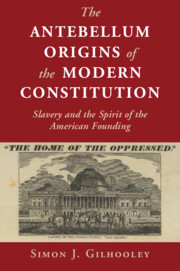Book contents
- The Antebellum Origins of the Modern Constitution
- Cambridge Studies on the American Constitution
- The Antebellum Origins of the Modern Constitution
- Copyright page
- Dedication
- Epigraph
- Contents
- Acknowledgments
- Introduction
- 1 The Constitutional Imaginaries of the Missouri Crisis
- 2 The Declaration of Independence and Black Citizenship in the 1820s
- 3 Abolitionism and the Constitution in the 1830s
- 4 The Slaveholding South and the Constitutionalization of Slavery
- 5 Theories of the Federal Compact in the 1830s
- 6 Slavery, the District of Columbia, and the Constitution
- 7 The Congressional Crisis of 1836
- 8 The Compact and the Election of 1836
- 9 The Afterlife of the Compact of 1836
- Conclusion
- Bibliography
- Index
2 - The Declaration of Independence and Black Citizenship in the 1820s
Published online by Cambridge University Press: 16 October 2020
- The Antebellum Origins of the Modern Constitution
- Cambridge Studies on the American Constitution
- The Antebellum Origins of the Modern Constitution
- Copyright page
- Dedication
- Epigraph
- Contents
- Acknowledgments
- Introduction
- 1 The Constitutional Imaginaries of the Missouri Crisis
- 2 The Declaration of Independence and Black Citizenship in the 1820s
- 3 Abolitionism and the Constitution in the 1830s
- 4 The Slaveholding South and the Constitutionalization of Slavery
- 5 Theories of the Federal Compact in the 1830s
- 6 Slavery, the District of Columbia, and the Constitution
- 7 The Congressional Crisis of 1836
- 8 The Compact and the Election of 1836
- 9 The Afterlife of the Compact of 1836
- Conclusion
- Bibliography
- Index
Summary
A transformation of the Declaration of Independence’s symbolism in the 1820s that proved useful for those advancing claims on behalf of black Americans. In the first instance, the Declaration became more closely associated with a commitment to equality. In the second instance, the project of unifying the nation around the sacred text of the Declaration had the effect of providing a written expression of American nationalism as a value-laden concept. This chapter traces the ways in which free black writers sought to exploit both opportunities, ultimately generating an understanding of American citizenship that would inform the wider abolitionist movement of the 1830s. These efforts saw free black writers advance claims upon American citizenship with pamphlets, including David Walker’s Appeal, and the first African American owned and operated newspaper in the United States, Freedom’s Journal. Associating this understanding of the Declaration with the U.S. Constitution provided a framework for understanding the Constitution as committed to an expansive notion of the People and provided an important orientating concept for the abolitionist movement as it evolved into the 1830s.
Keywords
- Type
- Chapter
- Information
- The Antebellum Origins of the Modern ConstitutionSlavery and the Spirit of the American Founding, pp. 42 - 62Publisher: Cambridge University PressPrint publication year: 2020



